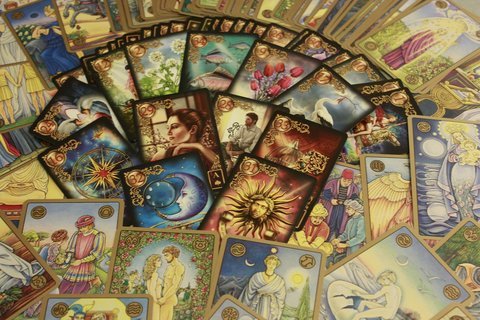When you want to learn how to read cards, I would suggest that you start with Lenormand instead of Tarot. I tried to start with Tarot and was pretty confused. There were a lot of cards and they didn't really "speak" to me. With Lenormand most of the symbols on the cards are easier to understand, for example, the heart stands for love and passion.

1. Chose your deck
A lot of books say that you should start with the traditional deck. However, I think you should pick the one that you like. The one that speaks to you and that you think is aesthetically pleasing. For example, there are decks that have two woman cards for same-sex relationships. That way you don't have to assign someone the male card. If you want to take it the lazy and easy way, chose a deck that has the explanations written on it.
Here are the ones I have: Dreaming Way Lenormand

2. Get to know your deck
Go through the cards and the booklet. I think even when you already have some experience reading the cards, the booklet that usually comes with the cards provides some information that is specifically on that deck. For the beginner, the booklet is a great way to get started. It usually should include a short description of the cards and different spreads.
3. Read
When you want to get into more detail of what the cards mean: read! I would suggest buying a book
4. Brainstorming
Do some brainstorming with your cards. That means that you go through your deck like flashcards and think of what each card could mean. That helps you to learn the different meanings, but also to come up with your own interpretations. You can even do this in different categories: love/ relationships, work, health, person, time, thing, place, action, description, spiritual, affirmation.
Let's give an example:
Depending on the context the heart card could be interpreted in the following ways:
- love / relationships = a new love, self-love, a close friend, "the one"
- work = a friendly and welcoming work environment, the job you love, your vocation
- health = issues connected to the heart and blood
- person = somebody who is working for an NGO or charity (very compassionate), a romantic
- time = warmer months (spring, summer)
- thing = everything heart-shaped, red, a kiss, roses
- place = a romantic place, where your heart chakra is
- action = to love, to give,
- description = generous, loving, romantic, altruistic, warm,
- spiritual = working with the heart chakra, self-love, open your heart, forgiveness, compassion, gratefulness
- affirmation = I bow before my heart.
As you can see, the heart still appears as the theme of the different contexts but it does not only have to refer to the love between two people. Of course, you could extend the list!
5. Combinations
That already seems like a lot, but of course, you can focus on what is important to you first. For example, if you want to do readings for yourself on your work. Start brainstorming that! When you have done that it is time to combine the cards. That means you take one card and combine it with every other card in the deck. For example, you combine the heart + the letter = love letter. (Okay, I have to admit that really was an easy one...) You're going to do that for the rest of the deck. (And yes, sometimes there is a difference if you have heart + letter or letter + heart*)
6. Practice
I find it easiest to practice on myself. Often I already know what the problem is. That way it is easier to interpret the cards. Start with easy spreads: two or better three cards a day. Write down your different interpretations and then check how they showed up during your day. (Yes, you should write them down, or at least snap a photo of the cards.) Then start to practice on your family, friends or strangers on the internet.
Personally, I don't take reading cards too seriously. It is a fun way to learn more about yourself and uncover things that you don't want to admit, but you know are true. And after all, you are the one who is in control, not the cards.
Let me know if you want to add any other categories to my brainstorming list!
Also, tell me about your experiences!
Good post
Follow me @dexabyte